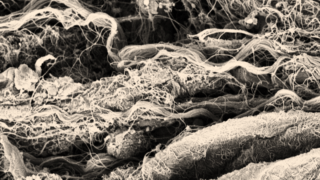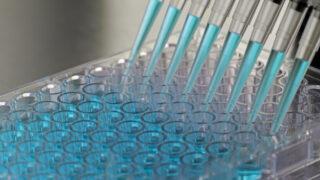Category: Publications
Search News
Categories
Archives
Ovarian cancer’s protective barrier: how the tumour matrix teaches cells to disarm immune attack
15th May 2023
The results suggest new strategies to overcome the cancer’s defences and treat patients more effectively
Read moreVitamin B5 could improve red blood cell production in people with myelodysplastic syndromes
2nd March 2023
Scientists from Barts Cancer Institute at Queen Mary University of London and the Francis Crick Institute, have uncovered why patients with a rare type of blood cancer suffer from ineffective red blood cell production, and how vitamin B5 could be combined with existing drugs to improve outcomes.
Read moreResearch on the use of urine biomarkers for early detection of pancreatic cancer
28th November 2022
Professor Tatjana Crnogorac-Jurcevic and her team at Barts Cancer Institute, Queen Mary University of London, are working to identify biological clues or ‘biomarkers’ for early, non-invasive detection of pancreatic cancer in urine samples. In their most recent paper, published in the International Journal of Cancer, the team reported that a urine biomarker panel could detect pancreatic ductal adenocarcinoma, the most common type of pancreatic cancer, up to 2 years before clinical diagnosis.
Read moreResearch identifies new way to halt pancreatic cancer invasion by targeting healthy cells
10th November 2022
Researchers from Barts Cancer Institute at Queen Mary University of London have identified a new channel of communication through which non-cancerous cells drive the invasion of cancer cells in pancreatic cancer. By blocking a particular signalling molecule within this pathway, called Fibroblast Growth Factor Receptor 1, the team was able to reduce invasion of pancreatic cancer cells in the laboratory.
Read moreStudy identifies how cancer-causing gene regulates genetic variation in prostate cancer
27th September 2022
Researchers from Barts Cancer Institute at Queen Mary University of London, the Italian Institute for Genomic Medicine, and the University of Milan have identified a novel role for a cancer-causing gene in controlling an important genetic process that underpins genetic variation in prostate cancer.
Read moreUnderstanding the role of cancer’s circular genome in tumour evolution
23rd September 2022
New research, co-led by Dr Benjamin Werner from Barts Cancer Institute at Queen Mary University of London, indicates that the circular DNA structures present in around a third of cancers lead to extensive genetic diversity within tumours, giving them the ability to adapt rapidly to environmental stress and resist targeted cancer treatment.
Read more





